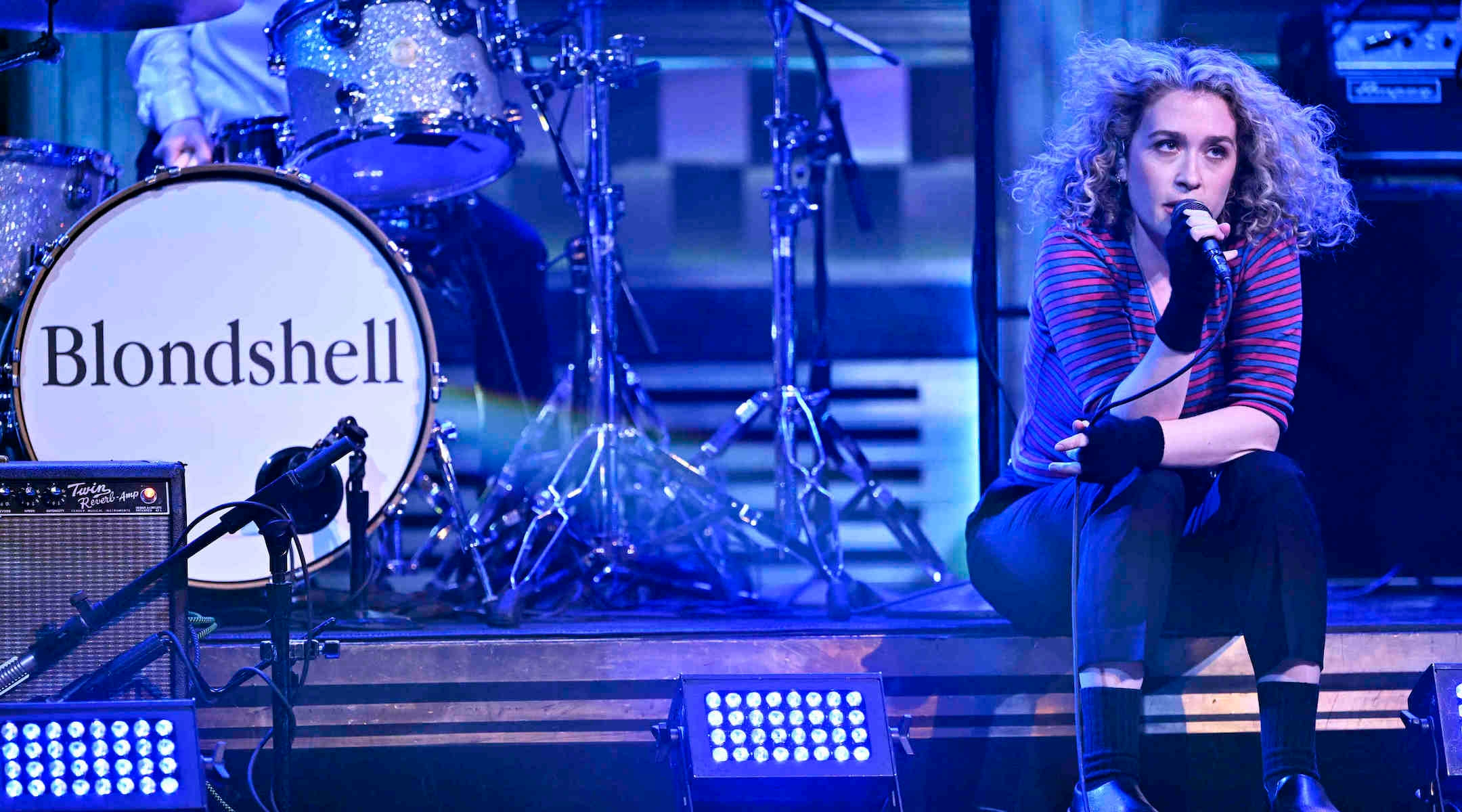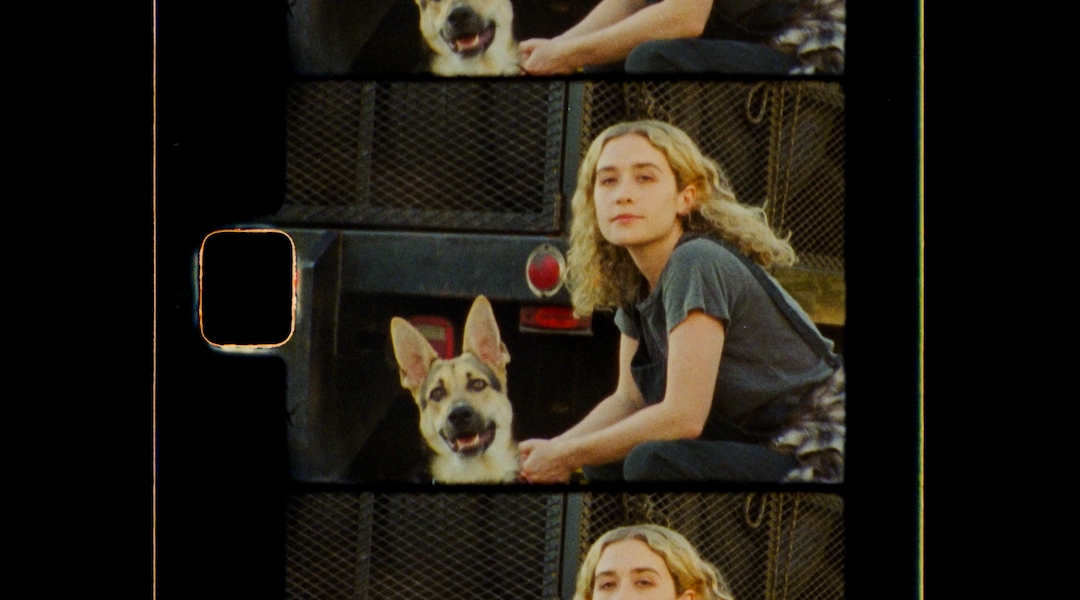(JTA) — When she sits down to write song lyrics, Sabrina Teitelbaum, who records music under the moniker Blondshell, doesn’t plan to reference her Jewishness. It just spills out in subtle turns of phrase.
In her song “Sepsis,” for instance, the quickly-rising 25-year-old rocker sings: “I think I believe in getting saved/Not by Jesus validation/In some dude’s gaze.”
In “Salad,” her latest track, which she debuted on Jimmy Fallon’s late-night show Tuesday night, she flirts with the idea of poisoning a friend’s abuser. She sings: “Look what you did/You’ll make a killer of a Jewish girl.”
“I was bat mitzvahed and the whole thing, but I don’t know — I think, culturally, my Judaism finds its way into my music, even in ways that I haven’t really been aware of until somebody brought it up,” she said on Zoom last week from her home in Los Angeles.
Jewish-tinged dark humor is rarely seen in indie rock, especially in the woman-dominated subsets of the genre that Blondshell is being associated with, alongside the likes of Snail Mail, Soccer Mommy and Mitski. And she’s not afraid of putting it out there — the press release for “Salad” notes the song’s “nod” to her Jewishness and the fact that it came out on the first night of Passover.
Teitelbaum’s self-titled album, which is getting rave reviews in advance of its release on Friday, is full of the coming-of-age stories and feelings found in shows like “Girls” and “Broad City.” On “Kiss City,” she sings, “I think my kink is when you tell me that you think I’m pretty.” On “Joiner”: “You’ve been running around LA with trash/Sleeping in bars with a gun in your bag/Asking can I be somebody else.”
The constant undertone is one of personal trauma — from unhealthy relationships, bad sex and other dark things in her personal life that she didn’t want to elaborate on.
“There are just ways of talking about trauma that I think are kind of distinctly Jewish,” she said, “and that comes up in my music for sure.”
It’s all accompanied by earworm pop melodies and the thick guitar sounds found in some of her biggest influences from the ’90s, like Hole (Courtney Love’s main outfit) and PJ Harvey.
Teitelbaum was born in New York to a Jewish dad and a mom who converted to Judaism. She spent a lot of time watching “Curb Your Enthusiasm” and clips of Sarah Silverman standup on YouTube with her sister. The family attended a Reform synagogue and celebrated the major holidays.
She spent two years in USC’s music writing program before dropping out to fast-track her career. Before the COVID-19 pandemic, she wrote electronic pop under the name BAUM. But during lockdown, she dug deep back into ’90s rock and set out at first with just a goal of improving her guitar skills.
“I was like, ‘OK, I’m going to get better. And I’m going to sit down and practice for an hour a day,’ or whatever it was. And I would procrastinate by writing,” she said. “Because I was like, I don’t want to do scales and get better at chord structure, those things. So yeah, it was me trying to get better at guitar that led to everything.”

Teitelbaum performs on “The Tonight Show Starring Jimmy Fallon,” April 5, 2023. (Todd Owyoung/NBC)
After finishing a batch of songs as Blondshell, she signed to the buzzy Partisan Records — home to a slew of acclaimed rock groups, such as Fontaines, D.C., Idles and The Black Angels — and began releasing songs last summer. She was quickly grouped together with the vanguard of other female alt-rockers, who have been relentlessly talked about in music journalism for about a decade. The comparisons bring up mixed feelings.
“It can be flattening. People are like, ‘You’re the wave of songwriters, Phoebe Bridgers and Soccer Mommy,’” she said. “My music doesn’t sound anything like Phoebe Bridgers.”
But she added that she is prone to do some categorizing, too.
“There are a lot of women in rock. And so I also get it and I myself have done it when I’m talking about who had been influenced by — I’m like, you know, women in rock in the 90s, PJ Harvey and Courtney Love. I’m also grouping them together.”
Heading out to tour last year across the heart of the country in a van was a startling experience. It was the first time in a while — possible ever — where, as a Jew, she felt like a minority.
“I’m always surrounded by other Jews — like everybody I work with is Jewish,” she said, referencing her manager (Shira Knishkowy), her producer (Yves Rothman) and others she has met in the industry. She mentioned other Jewish rockers she has looked up to, too, including Jeff Tweedy of Wilco and the sisters of Haim.
“[Now] this thing keeps happening where I’m like the only Jew on a tour… It’s a new experience that I’m having,” she said. “It kind of gives a different context to my upbringing, and to who ends up feeling familiar to me.”
In a recent conversation with her Jewish grandmother, Teitelbaum was asked a familiar question.
“She was like, ‘What’s your manager’s name?’ I said ‘Shira.’ She said, ‘Oh, a nice Jewish girl. Does she know her name means song?’ And I was like, ‘she knows,’” Teitelbaum said with a laugh.
JTA has documented Jewish history in real-time for over a century. Keep our journalism strong by joining us in supporting independent, award-winning reporting.






